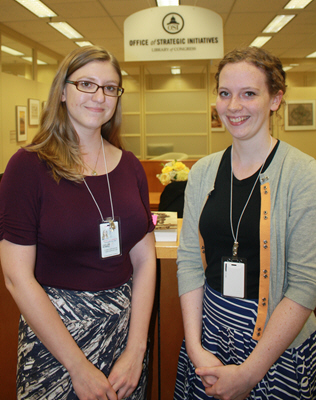The following is a guest post by Emily Reynolds and Chelcie Rowell, 2012 Junior Fellows.
Every summer, the Library of Congress hosts interns as part of its Junior Fellows program. This year, 38 students from across the country were placed in a variety of library departments. Two fellows—Emily Reynolds and Chelcie Rowell—are working in the Office of Strategic Initiatives on a variety of digital preservation projects.
Their main activity will be to contribute to an ongoing effort to refine digital preservation policies at the Library. The Library’s Preservation Working Group has already created the first draft of a policy framework based on the digital life cycle. Along with other OSI staff, Emily and Chelcie will interview staff from curatorial units about existing digital preservation practices and workflows and document what they learn as case studies. Following interviews with curatorial units, Chelcie will help to fold their findings into a revision of the internal policy draft, and Emily will incorporate lessons learned into video outreach materials for an external audience of practitioners.
Meet Emily
I just completed my first year as a master’s student at the University of Michigan School of Information. My professional interests include digital preservation, web archiving, and digital archives, which I developed while working on digitization and digital preservation projects both before and during graduate school. Most recently, I created a digitization policy and large-format scanning workflow for a map library, a project that also incorporated the library’s spatial and numeric data services. Seeing the intellectual value that can be added to digitized materials with this kind of collaboration confirmed my belief in the importance of digital access and continuing innovation in libraries and archives.
Some of my projects this summer will involve the Digital Preservation Outreach and Education initiative. While working in small cultural heritage institutions, I came to understand the need for the dissemination of accessible and actionable information regarding digital preservation standards and strategies, which DPOE offers through its training sessions and curriculum materials. Having experienced firsthand how difficult it can be for institutions with limited resources to establish digital preservation practices that meet their needs, I am particularly interested in digital preservation policy development and in ensuring the sustainability of preservation programs over time. I hope that the work I do this summer will enhance DPOE training materials by creating practical connections between its high-level training modules and the ways that any institution, large or small, can create a sustainable digital preservation program.
After frequently using OSI resources both at work and in my School of Information classes, I am excited to have the opportunity to be involved with the department’s activities and see how things work behind the scenes. The interviews that Chelcie and I conduct will also allow us to better understand how the Library’s different curatorial units deal with the challenges inherent in managing digital collections containing (like the Library’s analog collections) a wide range of formats and materials.
Meet Chelcie
I am a graduate student at the University of North Carolina at Chapel Hill, where I’m pursuing a Master’s of Science in Information Science with coursework concentrated in the area of digital curation. Before entering library school, I worked two years as a writing tutor and administrator at a small liberal arts college, where my position required day-to-day advocacy of the writing program to both students and faculty. After the first year of my master’s program, I was motivated to apply to the Junior Fellows program in the area of digital preservation in order to build on my background of outreach within the newer (to me) context of managing digital assets over their life cycle.
My interest in librarianship originated with special collections. After contributing to digital initiatives at a number of small- to medium-sized cultural heritage institutions, my interests shifted to providing persistent digital access to unique materials, both digitized and born-digital. During the academic year I work for a state-wide collaborative digital publishing program and a large academic library, where I helped to develop a workflow for born-digital accessions at the command line. Like Emily, I experienced first-hand practitioners’ need for digital preservation learning tools!
This year I’ve followed OSI initiatives like Viewshare with keen interest because they allow the kinds of institutions where I had worked to present collection items to researchers not just singly but also in the aggregate as data. I’ve also grown increasingly aware that performing digital preservation and providing digital access requires becoming comfortable within a constantly shifting matrix of technological options and organizational cultures.
Working at NDIIPP this summer offers me the opportunity to unite my interests in outreach—navigating an organization’s different structures of collaboration—and managing digital collections for the long term. Working with the Preservation Working Group and interacting with curatorial units, I look forward to participating in collaborative policy development on such a large scale. I hope that my contributions will strengthen the final policy and that I’ll become an even more practiced collaborator.
Throughout the summer, OSI’s Junior Fellows will post updates about their work to The Signal. They will conclude their time at the Library by displaying their work in a group exhibit.

